Alfa Romeo Junior vs SsangYong Tivoli – Which model is better for everyday use?
Compare performance, boot capacity, efficiency and price at a glance.
Find out which car is the better choice for you – Alfa Romeo Junior or SsangYong Tivoli?
Costs and Efficiency:
When it comes to price and running costs, the biggest differences usually appear. This is often where you see which car fits your budget better in the long run.
SsangYong Tivoli has a to a small extent advantage in terms of price – it starts at 21400 £, while the Alfa Romeo Junior costs 25700 £. That’s a price difference of around 4251 £.
Fuel consumption also shows a difference: Alfa Romeo Junior manages with 4.80 L and is therefore clearly more efficient than the SsangYong Tivoli with 7 L. The difference is about 2.20 L per 100 km.
Engine and Performance:
Power, torque and acceleration are the classic benchmarks for car enthusiasts – and here, some clear differences start to show.
When it comes to engine power, the Alfa Romeo Junior has a significantly edge – offering 280 HP compared to 163 HP. That’s roughly 117 HP more horsepower.
In terms of top speed, the Alfa Romeo Junior performs slightly better – reaching 206 km/h, while the SsangYong Tivoli tops out at 181 km/h. The difference is around 25 km/h.
There’s also a difference in torque: Alfa Romeo Junior pulls a bit stronger with 345 Nm compared to 280 Nm. That’s about 65 Nm difference.
Space and Everyday Use:
Whether family car or daily driver – which one offers more room, flexibility and comfort?
Both vehicles offer seating for 5 people.
In curb weight, SsangYong Tivoli is minimal lighter – 1375 kg compared to 1380 kg. The difference is around 5 kg.
In terms of boot space, the SsangYong Tivoli offers decisively more room – 720 L compared to 415 L. That’s a difference of about 305 L.
In maximum load capacity, the SsangYong Tivoli performs a bit better – up to 1440 L, which is about 160 L more than the Alfa Romeo Junior.
When it comes to payload, SsangYong Tivoli barely noticeable takes the win – 455 kg compared to 420 kg. That’s a difference of about 35 kg.
Who comes out on top?
Overall, the Alfa Romeo Junior shows itself to be has the upper hand and secures the title of DriveDuel Champion.
It convinces with the more balanced overall package and proves to be the more versatile choice for everyday use.
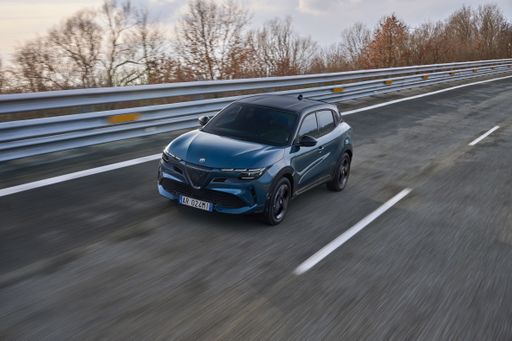 @ Alfa Romeo / Stellantis Media
@ Alfa Romeo / Stellantis Media
Alfa Romeo Junior
Alfa Romeo Junior
The Alfa Romeo Junior captures the essence of Italian design with its sleek lines and compact dimensions, making it an icon of elegance and performance. With a spirited driving experience and a charming retro aesthetic, it appeals to enthusiasts and casual drivers alike. This delightful car embodies the brand's rich heritage while remaining a fun and engaging option for those seeking a unique automotive experience.
details @ Alfa Romeo / Stellantis Media
@ Alfa Romeo / Stellantis Media
 @ Alfa Romeo / Stellantis Media
@ Alfa Romeo / Stellantis Media
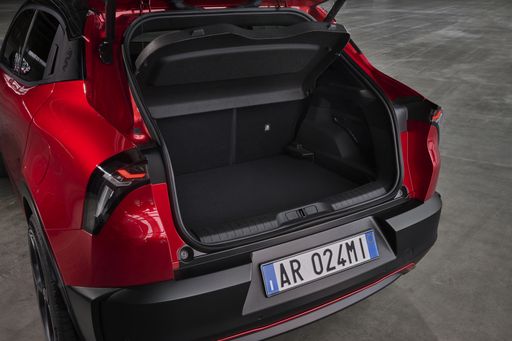 @ Alfa Romeo / Stellantis Media
@ Alfa Romeo / Stellantis Media
SsangYong Tivoli
The SsangYong Tivoli is a compact SUV that seamlessly blends style with practicality, making it an appealing choice for urban drivers. Its sleek design is complemented by a well-crafted interior, offering a comfortable and spacious experience for passengers. With its reliable performance and modern features, the Tivoli stands out as a versatile option in the competitive compact SUV market.
details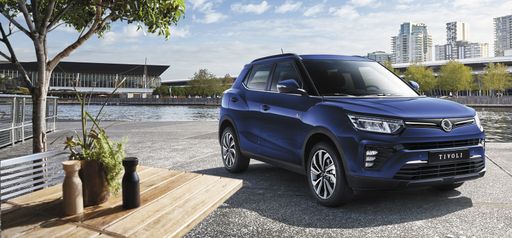 @ SsangYong Motor / KG Mobility
@ SsangYong Motor / KG Mobility
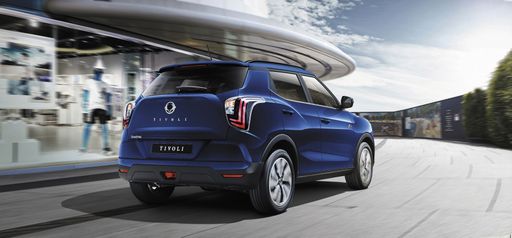 @ SsangYong Motor / KG Mobility
@ SsangYong Motor / KG Mobility
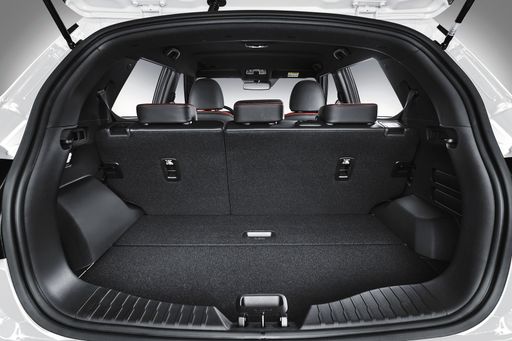 @ SsangYong Motor / KG Mobility
@ SsangYong Motor / KG Mobility
 @ Alfa Romeo / Stellantis Media
@ Alfa Romeo / Stellantis Media
|
 @ SsangYong Motor / KG Mobility
@ SsangYong Motor / KG Mobility
|
|
|
|
Costs and Consumption |
|
|---|---|
|
Price
25700 - 41600 £
|
Price
21400 - 30300 £
|
|
Consumption L/100km
4.8 - 5.4 L
|
Consumption L/100km
7 - 8.3 L
|
|
Consumption kWh/100km
15.1 - 17.5 kWh
|
Consumption kWh/100km
-
|
|
Electric Range
344 - 410 km
|
Electric Range
-
|
|
Battery Capacity
0.4 - 51 kWh
|
Battery Capacity
-
|
|
co2
0 - 119 g/km
|
co2
161 - 191 g/km
|
|
Fuel tank capacity
44 - 45 L
|
Fuel tank capacity
50 L
|
Dimensions and Body |
|
|---|---|
|
Body Type
SUV
|
Body Type
SUV
|
|
Seats
5
|
Seats
5
|
|
Doors
5
|
Doors
5
|
|
Curb weight
1380 - 1689 kg
|
Curb weight
1375 - 1492 kg
|
|
Trunk capacity
340 - 415 L
|
Trunk capacity
395 - 720 L
|
|
Length
4173 mm
|
Length
4225 - 4480 mm
|
|
Width
1781 mm
|
Width
1810 mm
|
|
Height
1505 - 1538 mm
|
Height
1613 - 1646 mm
|
|
Max trunk capacity
1205 - 1280 L
|
Max trunk capacity
1115 - 1440 L
|
|
Payload
390 - 420 kg
|
Payload
425 - 455 kg
|
Engine and Performance |
|
|---|---|
|
Engine Type
Electric, Petrol MHEV
|
Engine Type
Petrol
|
|
Transmission
Automatic
|
Transmission
Manuel, Automatic
|
|
Transmission Detail
Dual-Clutch Automatic, Reduction Gearbox
|
Transmission Detail
Manual Gearbox, Automatic Gearbox
|
|
Drive Type
Front-Wheel Drive, All-Wheel Drive
|
Drive Type
Front-Wheel Drive, All-Wheel Drive
|
|
Power HP
136 - 280 HP
|
Power HP
163 HP
|
|
Acceleration 0-100km/h
5.9 - 9.1 s
|
Acceleration 0-100km/h
-
|
|
Max Speed
150 - 206 km/h
|
Max Speed
175 - 181 km/h
|
|
Torque
230 - 345 Nm
|
Torque
260 - 280 Nm
|
|
Number of Cylinders
3
|
Number of Cylinders
4
|
|
Power kW
100 - 207 kW
|
Power kW
120 kW
|
|
Engine capacity
1199 cm3
|
Engine capacity
1497 cm3
|
General |
|
|---|---|
|
Model Year
2024 - 2025
|
Model Year
2021 - 2024
|
|
CO2 Efficiency Class
A, C, D
|
CO2 Efficiency Class
F, G
|
|
Brand
Alfa Romeo
|
Brand
SsangYong
|
What drive types are available for the Alfa Romeo Junior?
Available configurations include Front-Wheel Drive or All-Wheel Drive.
The prices and data displayed are estimates based on German list prices and may vary by country. This information is not legally binding.
